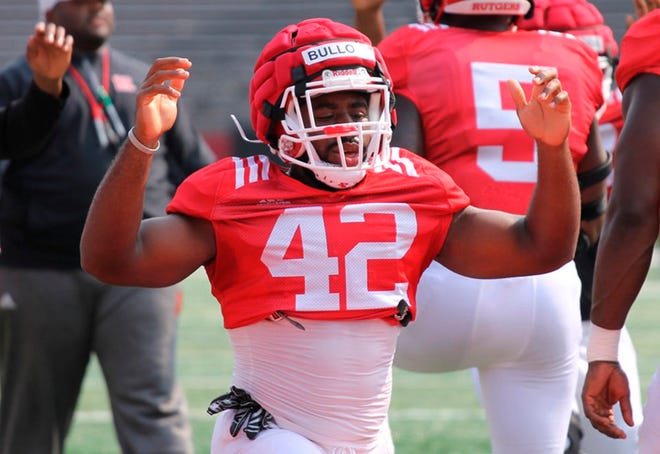[ad_1]
The state Supreme Court has ruled that statements made by a former Rutgers football player to university police about comments he allegedly made about plans to kill his girlfriend’s parents will not be allowed as evidence in his trial because his Miranda rights against self-incrimination were violated.
Izaia Bullock, a former linebacker for the Scarlet Knights, was indicted on Feb. 21, 2019, on two counts of first-degree attempted murder and two counts of first-degree conspiracy to commit murder in connection with comments he allegedly made on Oct. 29, 2018, to teammate Micah Clark.
The Supreme Court this week rejected the Middlesex County Prosecutor’s Office’s argument that the decisions by lower courts should be reversed.
Middlesex County Prosecutor Yolanda Ciccone had no comment on the Supreme Court decision.
After the indictment, Bullock asked Superior Court Judge Pedro Jimenez to suppress statements he made to Rutgers University Police officers about the comments. Jimenez threw out the statements and the Middlesex County Prosecutor’s Office appealed the ruling.
But a state Appellate Court agreed with Jimenez and the Middlesex County Prosecutor’s Office appealed that decision to the state Supreme Court.

Court papers say that Bullock, a Linden native, told Lauren Tredo, a former Rutgers Police detective, that he had made the comments to Clark inside the wide receivers’ room at the Hale Center.
Bullock said that although he didn’t have “a blueprint” about how he was going to kill his girlfriend’s parents, he told Clark he would find a way to drug the mother and then kill the father by perhaps making it appear as if “he hung himself, or something of that nature,” court papers say.
Bullock also asked Clark to be his getaway driver and asked if he had a gun, according to court papers.
Bullock told the detective that he was “stressed out” because he and his girlfriend were “going through a situation.” He said that her parents objected to the relationship because he was Black and she was white and that without their influence, he and his girlfriend could be together, according to court papers.
But Bullock added that although he was thinking about a plan, he did not see himself going through with it because he was not “about to go harm anybody,” court papers say.
After talking to Clark, Bullock had an appointment with his psychiatrist, and he told the detective he felt better and was back to “normal,” according to court papers.
A coach called Bullock after the appointment and said he had “heard something,” but Bullock assured him that he “didn’t mean it,” court papers say.
Bullock then headed to Clark’s dorm room but encountered a Rutgers Police officer instead, court papers say.

Bullock admitted to Peter Archibald, who is no longer a Rutgers Police officer, that he had said something earlier in the day about wanting to harm the girlfriend’s family, according to court papers.
After asking more questions, court papers say, Archibald told Bullock he was “not under arrest” and “not in trouble” but gave him his Miranda rights and took him to police headquarters where he was questioned by Tredo.
During that interrogation, Bullock made additional incriminating statements, including details of his plan to kill his girlfriend’s parents, according to court papers.
Bullock was charged the following day based on the interviews, a search of his car and an audio recording that a witness had turned over to police.
In its 45-page decision, the appellate panel agreed with Jimenez that the Rutgers Police officers had failed to properly give Bullock his Miranda rights and that Bullock did not give a clear waiver of his right to remain silent.
The appellate panel found that the officers’ failure during the questioning to tell Bullock what charges he was facing was “fatal to eliciting a waiver” of his Miranda rights.
Because he was not aware of the charges, the appellate court ruled, Bullock could not make a “knowing and intelligent waiver.”
The appellate judges also noted that Bullock had no prior contact with the criminal justice system and told police that he expected to go home at the end of the interrogation.
The Supreme Court agreed with the lower courts’ rulings, saying that the Prosecutor’s Office had “failed to prove beyond a reasonable doubt that (Bullock) knowingly, voluntarily and intelligently waived his Miranda rights.”
The charges against Bullock are pending and are on the Superior Court’s trial calendar.
Email: mdeak@mycentraljersey.com
Mike Deak is a reporter for mycentraljersey.com. To get unlimited access to his articles on Somerset and Hunterdon counties, please subscribe or activate your digital account.
[ad_2]
Source_link


